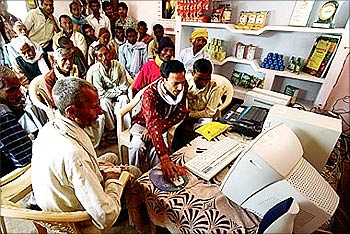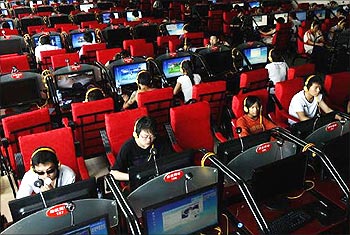 | « Back to article | Print this article |
IT competitiveness: The top 10 nations
India ranks 44th in the world in the IT industry competitiveness index 2009, moving 4 notches up from its 2008 ranking of 48th. India has an overall score of 34.1 on the IT competitiveness index, according to a study by the Economist Intelligence Unit.
The study compares the information technology (IT) industry environments of 66 economies, to determine the extent to which they enable IT sector competitiveness.
"India will not only continue to be an IT power but will become a global leader of IT innovation, products and services. India's true potential in near future will rest on its ability to indigenously innovate on cutting edge technology, increase domestic investment in R&D activities, promote the value of intellectual property and drive down menace of counterfeiting and piracy," Keshav S Dhakad, Chair of the BSA India Committee.
"We are pleased to see that in this year's index, India has shown strong improvement in its overall IT competitiveness ranking which is a very positive indicator of progress for one of the country's most dynamic industries," he said.
Conversely, the slow march of broadband in emerging markets, including those with large IT sectors such as India, Brazil and Russia, could impede their IT firms' growth, the study states.
"India has maintained its ability to develop strong talent and maintain a conducive business environment, which is reflective in the six drivers of competitiveness. This year's ranking is indicative of the progressive initiatives taken by the government & the industry on human capital and support for IT development."
IT competitiveness: The top 10 nations
India has shown some improvement in its R&D environment, moving from a score of 0.6, last year to 22.0 this year. It has also shown strong performance in the business environment and encouraging improvements in the legal environment. India still continues to have the advantage of human capital. However, fluctuating performance in IT infrastructure needs improvement.
In fast growing markets like India, large pools of skilled IT employees remain a significant advantage, but uneven progress in other areas -- such as IT infrastructure -- remains a drag on sector competitiveness. As the Internet becomes all pervasive, slow uptake in broadband and PC penetration has had a significant impact on the IT infrastructure in India.
Robust IP protection remains essential to IT sector competitiveness. As innovation gradually becomes more important than low-cost labour to IT firms in India, improvements in IP enforcement and the overall legal environment would make the country more competitive in the IT landscape.
Within Asia Pacific, India ranks amongst the top ten countries, with the top three positions held by Australia, Singapore and Japan. Coordinated efforts among governments, universities and IT firms in the region are needed to improve the quality of technology training. As in India, robust IP protection and broadband penetration are some of the key concerns in the Asia Pacific region.
Check out the nations that top the IT competitiveness index...
IT competitiveness: The top 10 nations
The United States is not among the top 10 nations in terms of broadband penetration but it scores high on IT infrastructure. It ranks No.1 in terms of human capital, fifth in R&D. It also tops in legal and business environment.
The IT industry is faring better than other sectors in the recession, although start-ups and smaller firms suffer from limited capital availability.
The business environments in developed countries have deteriorated but remain supportive of competition, foreign investment and trade; progress to improve business environments is mixed in emerging markets.
The government stimulus plans could generate opportunities for some IT firms, but "buy local" and other protectionist provisions will harm competitiveness, the study states.
According to the Economist Intelligence Unit, six factors work together to create a sound environment for the IT sector:
- An ample supply of skilled workers
- An innovation-friendly culture:
- A world-class technology infrastructure
- A robust legal regime that protects intellectual property
- A stable, open, and competitive economy; and
- Government leadership that strikes the right balance between promoting technology and allowing market forces to work.
IT competitiveness: The top 10 nations
Finland tops in overall business environment. It ranks 9th in broadband penetration. It also boasts of a robust IT infrastructure and strong support for technology R&D.
Finland has risen to 2nd in the index based mainly on its strong performance in the R&D environment category, particularly patents, and improvement in its overall business environment.
Broadband availability is becoming increasingly essential to IT sector competitiveness, as more IT offerings are delivered over the Internet. Broadband penetration and PC ownership continue to languish in emerging markets, putting their IT sectors at a disadvantage vis- -vis more developed markets.
Mobile-device penetration, however, is of growing relevance to software and other IT producers; many emerging markets score highly in this new index indicator, the study points out.
IT competitiveness: The top 10 nations
Sweden scores high on a good business environment and IT infrastructure.
The recession has temporarily eased the talent crunch for IT firms, particularly in developed markets. Talent shortages will re-emerge, however, and many producers continue to work with universities, government and other firms to improve technology education.
Asian countries continue to produce large numbers of IT employees but lag North America and Europe in providing well-rounded technology education.
IT competitiveness: The top 10 nations
Canada has a robust IT infrastructure and strong support for technology R&D, among other factors. Canada tops in R&D environment.
Canada is the most active generator of IT patent applications measured per 100 people.
The study states that small IT firms will remain drivers of innovation, particularly in software, despite limited capital funding. The Taiwanese, South Korean and Japanese firms remain the most prolific generators of IT patents in Asia.
IT competitiveness: The top 10 nations
Netherlands is among the top in the index thanks to a good IT infrastructure and strong support for technology R&D.
IP protection remains most effective in the developed world, but progress is being made in emerging economies.
Brazil, Egypt and Vietnam, among other countries, have boosted their performance in enforcing IP rights.
The rising incidence of cyber crime requires closer cross border co-operation on legislation, investigations and information-sharing, the study says.
IT competitiveness: The top 10 nations
The United Kingdom scores high on business environment, IT infrastructure and human capital. The most important tactic that governments can adopt in the immediate term is to avoid new trade restrictions or "buy local" requirements in the technology parts of their stimulus packages.
Local companies need to be granted fair opportunities if they are ever to prosper.
Countries where it is fairly easy to set up and run a business, where the venture-capital industry is an integral part of the business environment and where there is little stigma attached to failure (and there are few penalties for not succeeding) usually boast competitive IT industry environments.
IT competitiveness: The top 10 nations
Australia ranks high on legal and business environment. Australia is among the world's most prominent in developing broadband stimulus plans, showing how much importance their governments attach to improving broadband access.
In Australia, the government has announced a highly ambitious scheme to spend $30 billion on a nationwide fibre-optic network, using a combination of public and private sector money.
Australia ranks fifth in human capital and tenth in broadband penetration.Without a good supply of local talent, countries are unlikely ever to develop competitive IT sectors.
For all the IT graduates being churned out of Asian economies, there are still concerns that education systems in the region put too much focus on pure IT skills and not enough on IT in a business context. Top schools in the US and Europe do better in this area.
Australia ranks high on legal and business environment
Denmark, which is the 8th best in terms of IT competitiveness, tops in broadband penetration, business environment and IT infrastructure.
The report warns that protectionism and support for "national champions" will hinder recovery efforts - and longer term sector competitiveness.
The "buy local" provisions attached to some stimulus plans have been criticised by some IT industry executives for not recognising the increasingly global nature of the industry.
Spending public money on struggling companies will also only prevent more innovative firms from being able to compete.
IT competitiveness: The top 10 nations
Singapore tops the charts with a strong support for R&D and the IT firms' record of patenting innovations. It also ranks among the top ten in mobile penetration.
An important human capital indicator in our index is the capacity of a country's education system to train technology professionals with business as well as mainstream IT skills.
The US, UK and Ireland stand out among other countries on this measure, along with Australia, Canada and Singapore.
IT competitiveness: The top 10 nations
Norway ranks fifth in broadband penetration and scores high on IT industry development. Norway remains the leader, with Canada, the US, the UK and Finland the other countries in providing effective industry support while minimising market distortion.











